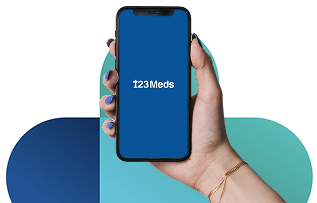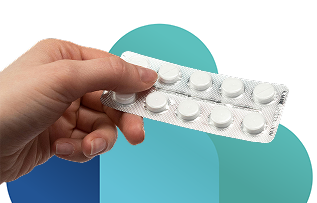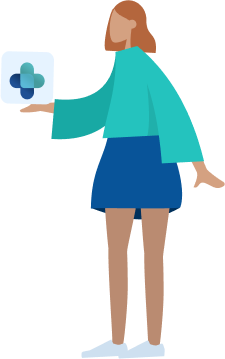Migraine
Migraines can lead to symptoms such as severe headaches that can cause throbbing pain, nausea, and sensitivity to light and sound, often disrupting work, sleep, and daily life.
We offer a range of medications, including options for immediate relief during acute attacks and preventive treatments for those with frequent migraines.
Through 123Meds, you can receive expert-approved treatments for migraine via our UK-registered online pharmacy service, with prescriptions reviewed by our UK based clinicians and delivered discreetly straight to your door.

pharmacists

consultations & orders

delivery before 3:30PM

Available Now
Migraines are a common neurological condition classified as a type of headache disorder. They typically involve moderate to severe head pain, often described as throbbing or pulsating, and may be accompanied by other symptoms such as nausea, vomiting, and sensitivity to light or sound.
Migraines affect up to 1 in 7 people, and are around three times more common in women than in men. They can occur at any age, but are most frequently experienced between the ages of 25 and 55.
The most common type is migraine without aura, where the headache develops without any warning signs. Some people experience migraine with aura, which involves temporary neurological symptoms—such as visual disturbances or pins and needles—just before the headache begins.
In more severe cases, a person may be diagnosed with chronic migraine, defined as experiencing a headache on 15 or more days per month.
Although migraine affects many people, migraine causes are not well understood. It is thought to involve a change in brain activity. This change can temporarily affect blood vessels, chemical messengers, and nerve signals in the brain.
Migraines can be triggered by a number of factors. Triggers can be different for different people and include:
- Head trauma
- Hormonal changes (e.g menstruation)
- Lack of sleep
- Stress
- Certain medicines (e.g hormone replacement therapy)
- Emotional triggers (e.g stress, anxiety)
- Missing meals or irregular meal times
- Alcohol
- Dehydration
- Caffeine
- Specific foods
The condition can also be genetic. If you have a family history of migraine, you are more likely to have it yourself.
The main symptom of a migraine is a moderate to severe headache, often described as throbbing or pulsating, typically affecting one side of the head. The pain may worsen with physical activity and can interfere with your ability to carry out normal daily tasks. Migraine headaches usually last between 4 and 72 hours.
Alongside the headache, other common symptoms may include:
- Sensitivity to light and sound
- Nausea or vomiting
- Diarrhoea
- Sweating
- Difficulty concentrating
Migraines with Aura
Some people experience migraine with aura, where symptoms appear before the headache begins. These act as a warning sign and usually develop gradually over several minutes, lasting less than an hour.
Aura symptoms may include:
- Visual disturbances (e.g. flashing lights, zigzag patterns, blind spots)
- Tingling or numbness, often in the face or hands
- Dizziness or balance problems
- Speech difficulties
Although migraines with aura are relatively common, they are less common than migraines without aura.
When to Seek Medical Advice
Migraine symptoms can sometimes resemble those of other conditions. For example, aura symptoms may be similar to those of a stroke, and a sudden or severe headache could indicate a more serious issue that needs urgent medical attention.
If you are unsure whether your symptoms are due to a migraine, or if you've never experienced one before, it is important to seek medical advice.
For further guidance, visit the NHS website for advice on when to seek urgent care for headaches.
There are several effective treatments available for managing migraines. These include painkillers, triptans, and anti-sickness medicines. Some are available over the counter, while others require a prescription from a healthcare professional.
Painkillers
Many people find painkillers help relieve migraine symptoms—particularly if taken at the first sign of an attack. Common options include:
- Paracetamol
- Ibuprofen
- Aspirin
- Co-codamol (a combination of paracetamol and codeine)
- Soluble (fast-dissolving) versions of these painkillers may offer quicker relief, as they are absorbed into the bloodstream more rapidly.
You can buy these over the counter in most pharmacies or online via our shop. Some are marketed specifically as headache or migraine relief tablets. For safety, always check the product information to ensure it’s suitable for you.
Note: Overuse of painkillers can, in rare cases, lead to medication-overuse headaches. It's best to avoid using them more than a few days per week without medical advice.
Triptans
Triptans are migraine-specific medications typically prescribed when painkillers are not effective. They work by narrowing blood vessels in the brain and reversing the changes associated with migraine attacks.
The most commonly prescribed triptan in the UK is sumatriptan, available in 50mg and 100mg tablets. A dose should be taken as soon as the headache phase begins (not during aura). If symptoms return, a second dose can be taken after two hours.
Other triptans include:
- Rizatriptan
- Zolmitriptan
- Naratriptan
- Imigran (branded version of sumatriptan)
These are usually taken in tablet form and take 30–60 minutes to start working. For faster relief or for people who experience nausea during attacks, nasal sprays or orodispersible (melt-in-the-mouth) tablets may be a better option.
Anti-Sickness Medicines
Nausea and vomiting are common migraine symptoms. Anti-sickness medications can be used alone or alongside painkillers or triptans.
Most anti-sickness treatments are prescription-only, but two are available over the counter:
- Buccastem M (contains prochlorperazine)
- Migraleve Pink (contains paracetamol, codeine, and buclizine)
- Buclizine, the anti-sickness ingredient in Migraleve, can help ease nausea during an attack. Migraleve Complete combines both pink and yellow tablets for pain and nausea relief.
Preventive Migraine Treatments
If migraines are frequent or particularly severe, your GP may recommend a preventive treatment to reduce how often they occur.
Common preventive medicines include:
- Propranolol (a beta-blocker)
- Amitriptyline (a tricyclic antidepressant)
- Topiramate (an anti-epileptic medication)
These medications are not available over the counter or from online pharmacies like 123Meds, as they require regular review by your GP. Your doctor will discuss the potential benefits and side effects to determine whether preventive treatment is right for you.
At 123Meds, you can access a range of effective migraine treatments, including triptans and combination products like Migraleve. Complete our online consultation to get started—your order will be reviewed by a UK-registered prescriber, and if appropriate, delivered discreetly to your door.
What is a migraine?
A migraine is a neurological condition that causes recurring episodes of moderate to severe headaches, often accompanied by symptoms like nausea, sensitivity to light and sound, and sometimes visual or sensory disturbances known as aura.
What does a migraine feel like?
Migraines typically cause a throbbing or pulsating pain, often on one side of the head. The pain can worsen with movement and may be severe enough to interfere with daily activities. Symptoms can last between 4 and 72 hours.
What are the common symptoms of a migraine?
Migraines often cause a one-sided headache that can be moderate to severe. Other common symptoms include nausea or vomiting, sensitivity to light or sound, and difficulty concentrating. Some people also experience visual disturbances such as flashing lights or blind spots, as well as tingling or numbness before or during an attack.
What is migraine with aura?
Migraine with aura includes temporary neurological symptoms that occur before the headache begins. These may include visual disturbances, numbness, dizziness, or difficulty speaking. Aura symptoms usually develop over a few minutes and last less than an hour.
What triggers migraines?
Migraine triggers vary from person to person, but common ones include stress, lack of sleep, or sudden changes in routine. Hormonal changes, bright lights, loud noises, and certain foods or alcohol can also set off an attack. Dehydration, missed meals, and either too much caffeine or withdrawal from caffeine are frequent triggers as well. Identifying and avoiding your personal triggers can help reduce how often migraines occur.
How are migraines treated?
Migraine treatment depends on the severity and frequency of your symptoms. For mild to moderate attacks, painkillers such as paracetamol or ibuprofen may be effective if taken early. Triptans, such as sumatriptan, can help by targeting the underlying migraine process, while anti-sickness medicines like buclizine or prochlorperazine may be used if nausea or vomiting is a problem.
For people who experience frequent or chronic migraines, a GP may prescribe preventive medicines to reduce how often attacks occur. Lifestyle measures such as regular sleep, hydration and avoiding known triggers can also play an important role in managing migraines.
What are triptans and how do they work?
Triptans are migraine-specific medications that work by narrowing blood vessels in the brain and reversing the changes that cause migraines. They are most effective when taken as soon as the headache phase begins.
Are migraines the same as headaches?
No. While migraines include a headache, they are usually more severe, last longer, and are often accompanied by other symptoms such as nausea or visual disturbances. Migraines are considered a neurological condition, not just a type of headache.
Can I treat migraines without a prescription?
Yes, some over-the-counter treatments like paracetamol, ibuprofen, and Migraleve are available without a prescription. However, if these are not effective, prescription medications like triptans may be more suitable.
When should I see a doctor about migraines?
You should speak to your GP if your migraines are becoming frequent, are getting worse, or if over-the-counter medicines are no longer helping. Medical advice is also important if you experience an aura for the first time, or if your symptoms are sudden, unusual, or particularly severe. A doctor can rule out other causes, provide stronger treatments if needed, and discuss preventive options for long-term management.
Fill out a quick form!
Fast, safe online consultations – no need to visit a GP or pharmacy.

Select your medication
Once you’ve completed the assessment, we’ll show you treatments that are right for you.

Prescriber review
Our prescribers will review your consultation and, if it's right for you, send a prescription to our pharmacy.

Express Delivery
Discreet delivery straight to your door, as soon as the next day.

Our 5-Point Safety Guarantee
We focus on trust, privacy, and expert service in online medication ordering.
GPHC and MHRA Regulated Pharmacy
Regulated by all necessary UK regulatory bodies
UK qualified Pharmacists
All consultations reviewed by UK pharmacists
Authentic Medication
Sourced from approved suppliers only
Customer Care
Customer care team available via email or phone
Trusted by Thousands
Thousands of satisfied customers

pharmacists

consultations & orders

delivery before 3:30PM

Available Now

